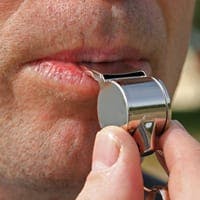Before you even think about blowing the whistle on dodgy professional conduct, experts warn you need to be aware the onus of personal protection could fall on you as the law might not be able to help.
Legal protection for whistleblowers in Australia has major defects, according to Professor of Governance at Victoria Law School Anona Armstrong, making personal protection crucial.
“Firstly, legal protection is much more effective in political and semi-political spheres than it is in the corporate sphere. Secondly, legal redress is simply beyond the financial power of most individuals,” Armstrong said.
As an example of the risks, Armstrong points to rumours of a ‘dirt file’ on Health Services Union whistleblower Kathy Jackson, who triggered Fair Work Australia’s investigation into MP Craig Thompson.
“It is important to know exactly what you are doing before getting in too deep as the risks can be high and the consequences severe,” she added.
If you’re considering becoming a whistleblower, you should think long and hard about the following:
- Is it really a genuine case or could have you misconstrued it?
- Have you tried to solve it internally first?
- Is there an outside organisation you can turn to for advice?
- Have you spoken to your lawyer?
- Have you spoken to your family – you will need them more than ever. Both income and money reserves need to be considered.
- Photocopy all relevant documents before blowing the whistle – it may be difficult to gain access afterwards.
- Make colleagues who pledge support do so in written, signed and witnessed statements so they won’t retract under pressure.
- Blow the whistle in a courteous and reasonable manner.

